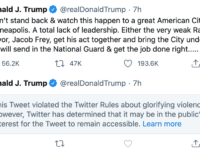U.S. President Donald Trump yesterday signed an executive order targeting Internet platforms after Twitter fact-checked one of his tweets on mail-in voting (the company followed up with a warning on another tweet earlier today involving glorifying violence). The order cannot simply reverse current U.S. law, but it encourages U.S. regulators to rethink how the Internet safe harbour provisions that limit liability for Internet platforms for third party content are implemented.
While the U.S. is obviously free to assess its statutory approach, one issue that received little attention is that the U.S. has effectively locked itself into the safe harbour system through its trade agreement with Canada and Mexico. The inclusion of safe harbour provisions in the agreement were viewed by some as an attempt to force Canada to adopt similar rules, yet the more likely reason for lobbying on the issue was to ensure that the U.S. itself was bound by the rules. Indeed, there were last minute efforts to remove the provision from the final deal, but those were ultimately rejected.







